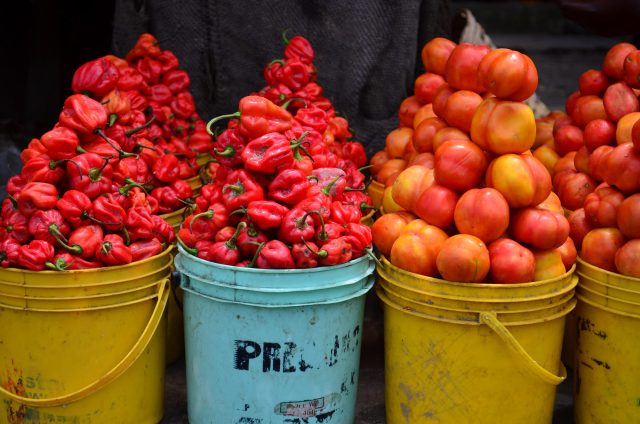The fluctuating price of tomato in the country has been attributed to seasonal harvest, changing weather, limited labour, and high cost of input.
HortiNigeria, which raised this alarm, identify other causes to include high cost of transportation, use of rafia basket, inadequate and limited storage facilities and limited access to market prime information.
However, there seems to be hope in sight, as the HortiNigeria project, implemented by the International Fertiliser Development Center (IFDC), with the support of the Netherlands government is already working in Ogun, Oyo, Kano and Kaduna states, to build a more resilient and equitable tomato value chain.
The Communication Coordinator, IFDC, Feyikemi Adurogbangba, in a statement, explained that prices of tomatoes often skyrocket between April and August due to heavy rains and seasonal demand spikes during religious observances like Ramadan.
She noted that from November to March, dry-season harvests in the North drive prices down, sometimes causing a glut, and in contrast, farmers in the South face higher pest pressures and labour shortages in the dry season, creating regional disparities in tomato availability.
To tackle the challenge of seasonal harvests and changing weather, she said that HortiNigeria in its intervention states has introduced and piloted solar-powered irrigation pumps that enable all-year-round farming, helping to balance seasonal availability.
On the issue of pest outbreaks in tomato farms, Adurogbangba said the project launched a robust Tuta absoluta campaign in Kaduna and Kano to raise awareness among farmers on effective control measures, saying the initiative combined training on Integrated Pest Management (IPM) using farmer-based demonstration plots with ongoing radio broadcasts in local languages.
She mentioned that without up-to-date market data, farmers often over-supply markets, leading to crashes, or miss out on high-value sales opportunities.
Adurogbangba added that since 2023, HortiNigeria has addressed the challenge by sharing real-time price updates across its social media platforms to enable farmers make informed marketing decisions, saying this has help reduced market glut, prevent panic sales, and improve overall supply chain efficiency.
To tackle labour shortage in the south, she said the firm linked farmers with platforms such as Farmcas, an agrobusiness that connects them with verified on-demand farm workers, saying this model improves workforce reliability, reduces operational delays enhancing supply consistency and moderate price fluctuations.
In response to policy shift such as fuel subsidy removals, inconsistent implementation of agriculture strategies, increase cost of doing business for farmers, Adurogbangba said HortiNigeria actively engages with policymakers, submit memos to the National Council on Agriculture and collaborate with groups like the Nigeria Agribusiness Group (NABG).
She added that in 2024, the programme influenced revisions to the 2017/2021 Tomato Policy, helped push for increased Credit Risk Guarantees from 30 to 50 per cent for plastic crates, and supported the rollout of frameworks for organic agriculture, saying these actions was aimed at reducing input costs and creating a more enabling environment for horticulture.
To tackle the issue of storage, lack of processing facilities, and damaged roads, she said the firm has deployed local Zero Energy Cool Chambers (ZECC) in Kaduna and Kano and also upgraded cold storage units in Ogun and Oyo in partnership with Eupepsia Place and NIHORT.
These facilities, according to her extend the shelf life of tomatoes, enabling farmers to wait for better market prices instead of selling at a loss immediately after harvest
To also reduce transit-related spoilage, HortiNigeria collaborated with LECON Finance, NIRSAL, National Plastic Crate association, Celplas and Mile 12 Market stakeholders to introduce plastic crates into the supply chain as against the traditional raffia baskets, which bruise tomatoes and contribute to spoilage within two days.







